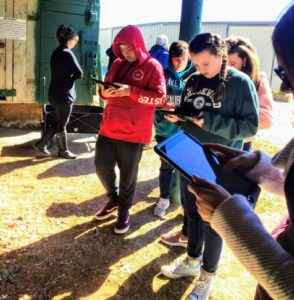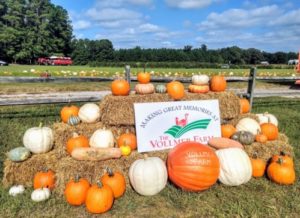A New Approach to Local Food Sustainability: Agritourism
go.ncsu.edu/readext?592001
en Español / em Português
El inglés es el idioma de control de esta página. En la medida en que haya algún conflicto entre la traducción al inglés y la traducción, el inglés prevalece.
Al hacer clic en el enlace de traducción se activa un servicio de traducción gratuito para convertir la página al español. Al igual que con cualquier traducción por Internet, la conversión no es sensible al contexto y puede que no traduzca el texto en su significado original. NC State Extension no garantiza la exactitud del texto traducido. Por favor, tenga en cuenta que algunas aplicaciones y/o servicios pueden no funcionar como se espera cuando se traducen.
Português
Inglês é o idioma de controle desta página. Na medida que haja algum conflito entre o texto original em Inglês e a tradução, o Inglês prevalece.
Ao clicar no link de tradução, um serviço gratuito de tradução será ativado para converter a página para o Português. Como em qualquer tradução pela internet, a conversão não é sensivel ao contexto e pode não ocorrer a tradução para o significado orginal. O serviço de Extensão da Carolina do Norte (NC State Extension) não garante a exatidão do texto traduzido. Por favor, observe que algumas funções ou serviços podem não funcionar como esperado após a tradução.
English
English is the controlling language of this page. To the extent there is any conflict between the English text and the translation, English controls.
Clicking on the translation link activates a free translation service to convert the page to Spanish. As with any Internet translation, the conversion is not context-sensitive and may not translate the text to its original meaning. NC State Extension does not guarantee the accuracy of the translated text. Please note that some applications and/or services may not function as expected when translated.
Collapse ▲The sustainability of local food systems depends on the purchasing of local goods and produce. This system not only supports local entrepreneurship, but also offsets carbon emissions associated with the transportation of goods across the country or globe. Sara Brune, Parks, Recreation, and Tourism Management doctoral student, is investigating the role of agritourism in promoting positive attitudes and action in local goods purchasing. Agritourism, or authentic agricultural-based operations that bring visitors to farms, is known to increase the income of farmers; however, its ability to influence and maintain sustainable behavior toward local food has yet to be uncovered until now.

Brune and her research team asked farm visitors to take surveys before and after the experience. Photo courtesy of S. Brune.
Brune, along with Drs. Barbieri, Stevenson and Knollenberg, is leading a multi-faceted project involving two stages. The first stage, undertaken in the fall of 2018, included data collection at three agritourism operations in the Western, Eastern, and Piedmont regions of North Carolina. On site, visitors took surveys before and after their agritourism experience, allowing Brune to assess the effect of farm visits. The preliminary results demonstrate that experiences do significantly increase positive attitudes and intentions to buy local produce and goods. Results also showed that people would be willing to increase their budget to buy local food by 5-10% after their farm visit.

Vollmer Farm of Franklin County–one of the three sites Brune and her team surveyed last fall. Photo courtesy of S. Brune.
The team is currently starting the second research stage that will measure the impact of agritourism in agriculture-related knowledge (ag-literacy). Brune is recruiting elementary teachers interested in implementing an ag-literacy curriculum, which will also include taking their students on field trips to farms offering agritourism. Children will be tested on their knowledge of agriculture and local food systems before and after visiting the farm. Since children may influence their household’s decisions by sharing their experiences and knowledge with parents, Brune will also survey parents to identify whether there is a change on their attitudes and intentions toward purchasing local food after their child’s farm visit.
The results of this study will shed light on the suitability of agritourism to educate the public on local food system sustainability and create a culture of supportive behaviors. Results can inform policy related to agritourism, a measure that supports local farmers, educates and empowers the public, and protects the environment.
Researchers:
Sara Brune, PhD Student
Dr. Carla Barbieri, Associate Professor and Tourism Extension Specialist
Dr. Whitney Knollenberg, Assistant Professor
Dr. Kathryn Stevenson, Assistant Professor


